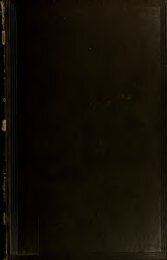Texts from the Buddhist canon : commonly known as Dhammapada
Texts from the Buddhist canon : commonly known as Dhammapada
Texts from the Buddhist canon : commonly known as Dhammapada
You also want an ePaper? Increase the reach of your titles
YUMPU automatically turns print PDFs into web optimized ePapers that Google loves.
122 DHAMMAPADA.<br />
"Amongst men <strong>the</strong>re is no one who is not<br />
blamed, <strong>from</strong> old time till now.^ Since <strong>the</strong>y blame<br />
<strong>the</strong> man of many words, <strong>the</strong>y blame <strong>the</strong> patient and<br />
<strong>the</strong>y also blame <strong>the</strong> man who seeks <strong>the</strong><br />
quiet man ;<br />
happy medium ; <strong>the</strong>re is always blame in <strong>the</strong> world.<br />
Those who desire to find fault with <strong>the</strong> righteous<br />
(holy) man are never able to discriminate with<br />
impartiality (take a middle course) ; <strong>the</strong>y blame him<br />
entirely or <strong>the</strong>y praise him entirely, but it is all<br />
done <strong>from</strong> some false idea of profit or fame.2 But<br />
he whom <strong>the</strong> enlightened and wise praise, and whom<br />
<strong>the</strong>y consider and call upright and good, a^ man of<br />
true wisdom and innocent life, without any ground<br />
for censure in '<br />
himself, <strong>as</strong> a Rabat for purity, <strong>the</strong>re<br />
is no blame for him—such an one <strong>the</strong> gods <strong>the</strong>mr<br />
selves must admire, even Brahma and ^akra must<br />
praise such an one/'<br />
Having concluded <strong>the</strong>se stanz<strong>as</strong>, <strong>the</strong> World-honoured<br />
One related this anecdote :— " There w<strong>as</strong> in days gone by<br />
a certain King, who loved above all things <strong>the</strong> flesh of <strong>the</strong><br />
wild goose for his daily food. Consequently he used to<br />
keep a hunter (or fowler) for <strong>the</strong> express purpose of<br />
snaring <strong>the</strong>se birds, and providing flesh for <strong>the</strong> royal<br />
table. One day <strong>the</strong> fowler having gone out for this pur-<br />
pose, <strong>the</strong>re came a flock of geese, 500 in number, with<br />
<strong>the</strong>ir king at <strong>the</strong>u^ head, and alighted in search of food<br />
just where <strong>the</strong> snares were set. In consequence <strong>the</strong> king<br />
of <strong>the</strong> birds w<strong>as</strong> trapped, and remained entangled in <strong>the</strong><br />
toils. Then <strong>the</strong> rest, in consternation, flew round and<br />
round <strong>the</strong> place, but would not leave it. One of <strong>the</strong> geese<br />
in particular kept flying close by <strong>the</strong> net, and, undaunted<br />
by <strong>the</strong> arrows of <strong>the</strong> fowler, kept utteriag piteous cries,<br />
1 Compare ver. 227 of <strong>the</strong> PaU. 2 These verses are very obseure.





